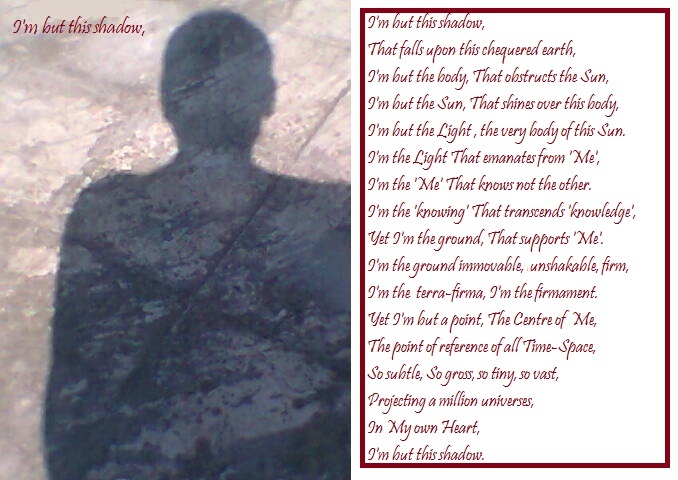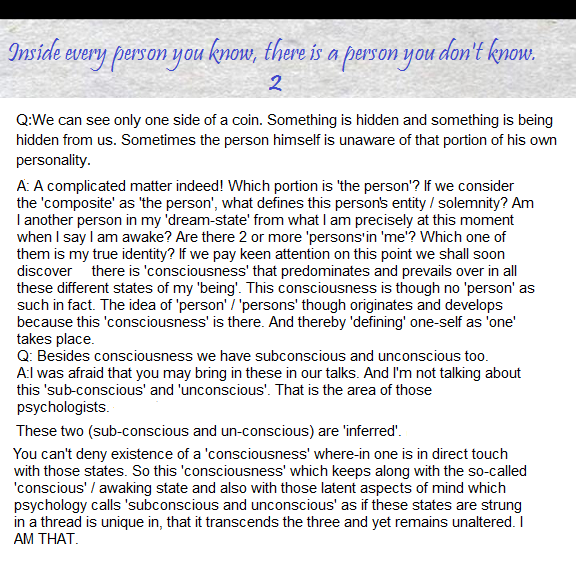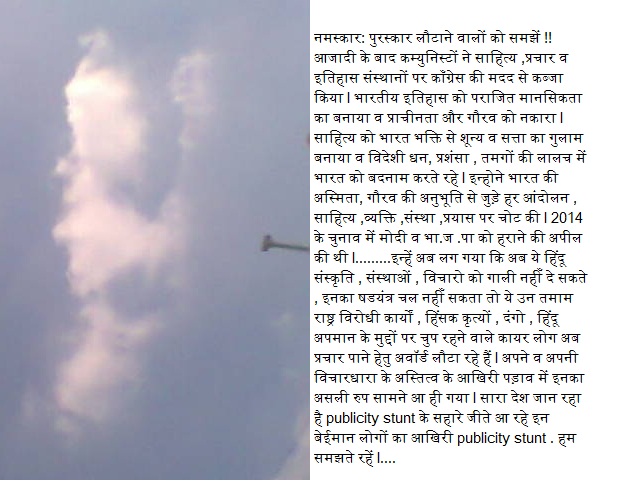सदेव सौम्य इदं अग्रं आसीत् ...
sadeva saumya idaṃ agraṃ āsīt
--
'sat' is always / ever prevalent.
... उपनिषद् upaniṣad declares.
’सत्’ / ’sat’ अलं / alaṃ .. सतः / sataḥ
/ अलं / alaṃ > looks like the true root of Cat-holic / Catholic.
'Cat' as prefix has the same meaning as in Sanskrit ’सत्’ / ’sat’,
Cation, catalyst, cathode, cataclysm ...could be traced to Sanskrit roots.And because the words reveal the meaning, which is the criteria of a right word in and according to Veda, this is the only possible authentic explanation.
Similarly, अलं / alaṃ > All, alle, allus, al (as in French et al) have their origin in Sanskrit अलं / alaṃ. We could see a beautiful link here that connects Arabic and English through Sanskrit.
संस्कृत Sanskrit 'इति अलं > 'iti alaṃ' has the same meaning as the French 'et al'.
And They have distorted सतं / sataṃ, ’सत्’ / ’sat’to 'Satan' to vilify Veda.
The Vatican itself is a distortion of 'Vedic'.
Veteran means one adept in Veda.
They have introduced 'Christ' and did a blunder made the whole thing confusing and diverting our attention from the True Essence of 'धर्म' / dharma. And they have been caught in their own trap.
They can't explain nor digest themselves the misconception of 'Immaculate Conception' and have reduced themselves to sheer hype and laughing stuff. But if they have courage, they could well correct this wonderful mistake done by them in some weak moments of history and give the humanity a new lease of Life.
Hope one day and as soon as they realize how this has caused great danger to the whole man-kind, they would with-draw this whimsical idea of 'Jesus' and 'Immaculate Conception' and truly 'save' the world.
--
The cat-holic approach?
Excuse me, Honestly and Seriously, no pun is intended!
--
प्रश्न : सर ! इसे कृपया हिंदी में समझा दीजिये। .....
उत्तर : गीता / भगवद्गीता / gītā / bhagavadgītā /
अध्याय 2, श्लोक 16 के अनुसार ’सत्’ का न तो कभी अभाव हो सकता है, और न ’असत्’ का अस्तित्व संभव है ।
ऋग्वेद मंडल 10 सूक्त 129 (नासदीय-सूक्तम्) के अनुसार भी ’सत्’ का यही स्वरूप है । इसलिये ’सत्’ सदा से ही विद्यमान है । ’असत्’ वह है जिसका अनुमान किया जाता है अर्थात् नाम-रूपयुक्त काल्पनिक जगत् जो हर मनुष्य के लिए भिन्न भिन्न और सतत परिवर्तित होता रहता है, ’अपने-आपके’ बारे में स्वयं उसका दृष्टिकोण भी । उपनिषद् सत् औरा असत् के बारे में यही कहते हैं ।
कैथोलिक शब्द इन दो पदों ’सतः’(’सत्’ - पञ्चमी, षष्ठी, एकवचन-रूप) तथा ’अल्’ के योग से निष्पन्न होता है । इस प्रकार वैदिक धर्म जीसस से भी पहले से प्रचलित है, ’अब्राहम’ (जो वेदों में अ-ब्रह्मन् के नाम से वर्णित है नाम-रूपयुक्त जगत् का नाम है ।) चूँकि नाम-रूप का अस्तित्व भी ’सत्’ / ’ब्रह्म’ से ही है, इसलिए परोक्षतः ’अब्रह्म’ भी ’ब्रह्म’ से अभिन्न है । यह वही ’अब्राहम’ है जो तमाम ’अब्राह्मिक’ धर्मों जैसे यहूदी, कैथोलिक और इस्लाम् तथा उनके दूसरेविभिन्न रूपों) का मूल है । ’देवी अथर्वण' में ’देवी’ (अर्थात् ’सत्’ का मातृ-रूप में अभिव्यक्त प्रकार) कहती है : मैं ’ब्रह्म’ और ’अब्रह्म’ दोनों हूँ । मैं देवता, राक्षस, यक्ष, गंधर्व, दैत्य आदि भी हूँ । इसलिए वेद के अनुसार परब्रह्म सत्, असत् और दोनों से विलक्षण भी है ।
ऐतिहासिक रूप से रोम का संबंध संभवतः ’रोमश’ या ’लोमश’ ऋषि से रहा होगा । ’इटली’ के अनेक स्थानों का संस्कृत मूल खोजा जा सकता है । इस व्युत्पत्ति की प्रामाणिकता इसी सिद्धान्त से सिद्ध होती है कि उन संस्कृत नामों के अनुसार व्यक्त ’अर्थ’ उन स्थानों की विशेषता को स्पष्ट करता है । जबकि आज के भाषाशास्त्री पहले तो ’इन्डो-यूरोपीय भाषा’ की कूट-रचना करते हैं फ़िर यह बतलाने का प्रयास करते हैं कि उस भाशा से ’संस्कृत’, ’लैटिन’ और दूसरी तमाम भारतीय और यूरोपीय भाषाओं का उद्भव कैसे हुआ । यह सब उठापटक सिर्फ़ इस मान्यता को पुष्ट करने के लिए कि ’अस्तित्व’ 5000 वर्षों से अधिक प्राचीन नहीं है, ’जीसस’ एकमात्र ’ईश-पुत्र’ हैं और जो जीसस में विश्वास लाएगा वह ’परम जीवन’ में जीवित होगा । एक ऐसा झूठ जिसका ’सृजन’ कैथोलिक चर्च ने इसलिए किया कि इस बहाने अपनी सत्ता को संसार पर थोपा जा सके । कैथोलिक चर्च यहीं तक नहीं रुका, ’जीसस’ नस्ल से एक यहूदी थे, लेकिन यहूदियों ने उन्हें उनके अवैध संतान होने से प्रताड़ित किया । कैथोलिक चर्च ने जीसस को इसलिए अपनाया ताकि इस प्रकार यहूदियों को परास्त किया जा सके । ’आतंक’ के सहारे कैथोलिक राज्य (न कि धर्म) ने अपने साम्राज्य का विस्तार किया । जैसे कैथोलिक चर्च ने ’गैलीलियो’ और अन्य कई वैज्ञानिकों / समाज-सुधारकों से ’क्षमा’ माँगी, वैसे ही यदि कैथोलिक चर्च पूरी मानवता से जीसस और उसके ’निर्दोष-गर्भाधान’ के इस छल और धोखे के लिए ’क्षमा’ माँग ले तो संभवतः सिर्फ़ मनुष्य का सर्वाधिक कल्याण होगा । और चूँकि जो ’बाइबिल’ में है, वही क़ुरान में है, इसलिए इस्लाम मूलतः कैथोलिक परंपरा का ही एक परिवर्तित संस्करण मात्र है, ऐसा कहना गलत नहीं होगा । वैसे शुरुआत तो यहूदियों के इस झूठ से हुई थी कि परमात्मा ने ’मोज़ेस’को दर्शन और उपदेश दिये । जिस यहोवा को यहूदी परंपरा में परमेश्वर कहा गया है, उसका उल्लेख ऋफ़्वेद मंडल 10 में 28 बार है । इसे हिब्रू (संस्कृत > ब्रूहि > बोलो, चूँकि हिब्रू भाषा दाहिने से बाँयी ओर लिखी जाती है) में चार हिब्रू वर्णों से ’यॉट्-हे-वौ-हे’ के द्वारा लिखा जाता है । इससे स्पष्ट है कि यहूदी परंपरा वैदिक धर्म का विकृत रूप मात्र है ।
--
sadeva saumya idaṃ agraṃ āsīt
--
'sat' is always / ever prevalent.
... उपनिषद् upaniṣad declares.
’सत्’ / ’sat’ अलं / alaṃ .. सतः / sataḥ
/ अलं / alaṃ > looks like the true root of Cat-holic / Catholic.
'Cat' as prefix has the same meaning as in Sanskrit ’सत्’ / ’sat’,
Cation, catalyst, cathode, cataclysm ...could be traced to Sanskrit roots.And because the words reveal the meaning, which is the criteria of a right word in and according to Veda, this is the only possible authentic explanation.
Similarly, अलं / alaṃ > All, alle, allus, al (as in French et al) have their origin in Sanskrit अलं / alaṃ. We could see a beautiful link here that connects Arabic and English through Sanskrit.
संस्कृत Sanskrit 'इति अलं > 'iti alaṃ' has the same meaning as the French 'et al'.
And They have distorted सतं / sataṃ, ’सत्’ / ’sat’to 'Satan' to vilify Veda.
The Vatican itself is a distortion of 'Vedic'.
Veteran means one adept in Veda.
They have introduced 'Christ' and did a blunder made the whole thing confusing and diverting our attention from the True Essence of 'धर्म' / dharma. And they have been caught in their own trap.
They can't explain nor digest themselves the misconception of 'Immaculate Conception' and have reduced themselves to sheer hype and laughing stuff. But if they have courage, they could well correct this wonderful mistake done by them in some weak moments of history and give the humanity a new lease of Life.
Hope one day and as soon as they realize how this has caused great danger to the whole man-kind, they would with-draw this whimsical idea of 'Jesus' and 'Immaculate Conception' and truly 'save' the world.
--
The cat-holic approach?
Excuse me, Honestly and Seriously, no pun is intended!
--
प्रश्न : सर ! इसे कृपया हिंदी में समझा दीजिये। .....
उत्तर : गीता / भगवद्गीता / gītā / bhagavadgītā /
अध्याय 2, श्लोक 16 के अनुसार ’सत्’ का न तो कभी अभाव हो सकता है, और न ’असत्’ का अस्तित्व संभव है ।
ऋग्वेद मंडल 10 सूक्त 129 (नासदीय-सूक्तम्) के अनुसार भी ’सत्’ का यही स्वरूप है । इसलिये ’सत्’ सदा से ही विद्यमान है । ’असत्’ वह है जिसका अनुमान किया जाता है अर्थात् नाम-रूपयुक्त काल्पनिक जगत् जो हर मनुष्य के लिए भिन्न भिन्न और सतत परिवर्तित होता रहता है, ’अपने-आपके’ बारे में स्वयं उसका दृष्टिकोण भी । उपनिषद् सत् औरा असत् के बारे में यही कहते हैं ।
कैथोलिक शब्द इन दो पदों ’सतः’(’सत्’ - पञ्चमी, षष्ठी, एकवचन-रूप) तथा ’अल्’ के योग से निष्पन्न होता है । इस प्रकार वैदिक धर्म जीसस से भी पहले से प्रचलित है, ’अब्राहम’ (जो वेदों में अ-ब्रह्मन् के नाम से वर्णित है नाम-रूपयुक्त जगत् का नाम है ।) चूँकि नाम-रूप का अस्तित्व भी ’सत्’ / ’ब्रह्म’ से ही है, इसलिए परोक्षतः ’अब्रह्म’ भी ’ब्रह्म’ से अभिन्न है । यह वही ’अब्राहम’ है जो तमाम ’अब्राह्मिक’ धर्मों जैसे यहूदी, कैथोलिक और इस्लाम् तथा उनके दूसरेविभिन्न रूपों) का मूल है । ’देवी अथर्वण' में ’देवी’ (अर्थात् ’सत्’ का मातृ-रूप में अभिव्यक्त प्रकार) कहती है : मैं ’ब्रह्म’ और ’अब्रह्म’ दोनों हूँ । मैं देवता, राक्षस, यक्ष, गंधर्व, दैत्य आदि भी हूँ । इसलिए वेद के अनुसार परब्रह्म सत्, असत् और दोनों से विलक्षण भी है ।
ऐतिहासिक रूप से रोम का संबंध संभवतः ’रोमश’ या ’लोमश’ ऋषि से रहा होगा । ’इटली’ के अनेक स्थानों का संस्कृत मूल खोजा जा सकता है । इस व्युत्पत्ति की प्रामाणिकता इसी सिद्धान्त से सिद्ध होती है कि उन संस्कृत नामों के अनुसार व्यक्त ’अर्थ’ उन स्थानों की विशेषता को स्पष्ट करता है । जबकि आज के भाषाशास्त्री पहले तो ’इन्डो-यूरोपीय भाषा’ की कूट-रचना करते हैं फ़िर यह बतलाने का प्रयास करते हैं कि उस भाशा से ’संस्कृत’, ’लैटिन’ और दूसरी तमाम भारतीय और यूरोपीय भाषाओं का उद्भव कैसे हुआ । यह सब उठापटक सिर्फ़ इस मान्यता को पुष्ट करने के लिए कि ’अस्तित्व’ 5000 वर्षों से अधिक प्राचीन नहीं है, ’जीसस’ एकमात्र ’ईश-पुत्र’ हैं और जो जीसस में विश्वास लाएगा वह ’परम जीवन’ में जीवित होगा । एक ऐसा झूठ जिसका ’सृजन’ कैथोलिक चर्च ने इसलिए किया कि इस बहाने अपनी सत्ता को संसार पर थोपा जा सके । कैथोलिक चर्च यहीं तक नहीं रुका, ’जीसस’ नस्ल से एक यहूदी थे, लेकिन यहूदियों ने उन्हें उनके अवैध संतान होने से प्रताड़ित किया । कैथोलिक चर्च ने जीसस को इसलिए अपनाया ताकि इस प्रकार यहूदियों को परास्त किया जा सके । ’आतंक’ के सहारे कैथोलिक राज्य (न कि धर्म) ने अपने साम्राज्य का विस्तार किया । जैसे कैथोलिक चर्च ने ’गैलीलियो’ और अन्य कई वैज्ञानिकों / समाज-सुधारकों से ’क्षमा’ माँगी, वैसे ही यदि कैथोलिक चर्च पूरी मानवता से जीसस और उसके ’निर्दोष-गर्भाधान’ के इस छल और धोखे के लिए ’क्षमा’ माँग ले तो संभवतः सिर्फ़ मनुष्य का सर्वाधिक कल्याण होगा । और चूँकि जो ’बाइबिल’ में है, वही क़ुरान में है, इसलिए इस्लाम मूलतः कैथोलिक परंपरा का ही एक परिवर्तित संस्करण मात्र है, ऐसा कहना गलत नहीं होगा । वैसे शुरुआत तो यहूदियों के इस झूठ से हुई थी कि परमात्मा ने ’मोज़ेस’को दर्शन और उपदेश दिये । जिस यहोवा को यहूदी परंपरा में परमेश्वर कहा गया है, उसका उल्लेख ऋफ़्वेद मंडल 10 में 28 बार है । इसे हिब्रू (संस्कृत > ब्रूहि > बोलो, चूँकि हिब्रू भाषा दाहिने से बाँयी ओर लिखी जाती है) में चार हिब्रू वर्णों से ’यॉट्-हे-वौ-हे’ के द्वारा लिखा जाता है । इससे स्पष्ट है कि यहूदी परंपरा वैदिक धर्म का विकृत रूप मात्र है ।
--





